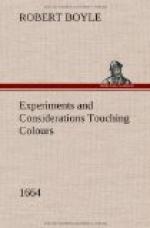recovers its Caeruleous Colour, I am thereby confirm’d
firm’d in my former Opinion, of the Sulphureous
Nature of these Salts. And so, whereas it is
much doubted by Some Modern Chymists to what sort
of Salt, that which is Praedominant in Quick-lime belongs,
we have been perswaded to referr it rather to Lixiviate
than Acid Salts, by having observ’d, that though
an Evaporated Infusion of it will scarce yield such
a Salt, as Ashes and other Alcalizate Bodyes are wont
to do, yet if we deprive our Nephritick Tincture of
its Blewness by just so much Distill’d Vinegar
as is requisite to make that Colour Vanish, the
Lixivium
of Quick-lime will immediately upon its Affusion recall
the Banished Colour; but not so Powerfully as either
of the Sulphureous Liquors formerly mention’d.
And therefore I allow my self to guess at the
Strength
of the Liquors examin’d by this Experiment,
by the
Quantity of them which is sufficient
to Destroy or Restore the Caeruleous Colour of our
Tincture. But whether concerning Liquors, wherein
neither Acid nor Alcalisate Salts are Eminently Praedominant,
our Tincture will enable us to conjecture any thing
more than that such Salts are not Praedominant in them,
I take not upon me to determine here, but leave to
further Tryal; For I find not that Spirit of Wine,
Spirit of Tartar freed from Acidity, or Chymical Oyl
of Turpentine, (although Liquors which must be conceiv’d
very Saline, if Chymists have, which is here no place
to Dispute, rightly ascrib’d tasts to the Saline
Principle of Bodyes,) have any Remarkable Power either
to deprive our Tincture of its Caeruleous Colour,
or restore it, when upon the Affusion of Spirit of
Vinegar it has disappear’d.
EXPERIMENT XI.
And here I must not omit, Pyrophilus, to inform
You, that we can shew You even in a Mineral Body something
that may seem very near of Kin to the Changeable Quality
of the Tincture of Lignum Nephriticum, for we
have several flat pieces of Glass, of the thickness
of ordinary Panes for Windows one of which being interposed
betwixt the Eye and a clear Light, appears of a Golden
Colour, not much unlike that of the moderate Tincture
of our Wood, but being so look’d upon as that
the Beams of light are not so much Trajected thorough
it as Reflected from it to the Eye, that Yellow seems
to degenerate into a pale Blew, somewhat like that
of a Turquoise. And what which may also appear
strange, is this, that if in a certain posture you
hold one of these Plates Perpendicular to the Horizon,
so that the Sun-beams shine upon half of it, the other
half being Shaded, You may see that the part Shin’d
upon will be of a much Diluter Yellow than the Shaded
part which will appear much more Richly Colour’d;
and if You alter the Posture of the Glass, so that
it be not held Perpendicular, but Parallel in reference
to the Horizon, You may see, (which perhaps you will
admire) the Shaded part look of a Golden Colour, but
the other that the Sun shines freely on, will appear




